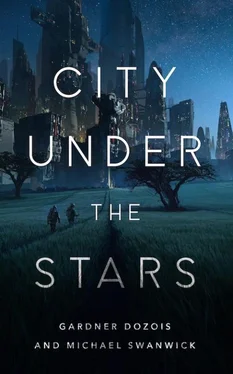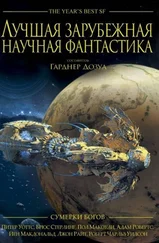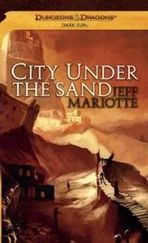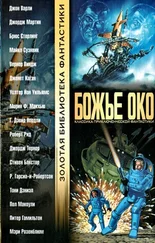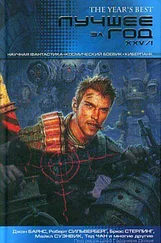Habit took over. Automatically, he sat down, tried to move his bowels. All the while, he watched himself, as if from a vantage point outside his body—one part of his mind was sardonically amused, one part was very afraid, and one part was murderously angry. The fearful part kept him going through the mundane actions of his normal life by rote, making him wash, dry himself, excrete—all rather desperately, as if by clinging to familiar routine he could negate and unmake the horrors of the day. The sardonic part was amused by the incongruity of trying to cling to normalcy when his life had just been blighted, destroyed, turned upside down, of carrying out the minutiae of life when he was dead. The angry part watched both others, and despised them both, and grew ever more angry at the conditions that had produced them—it knew nothing but hate.
There was an open, latticed window in the wall, giving a fine overview of the torchlit sprawl of nighttime Orange, but Hanson refused to look at it. He watched the wide lip of the window instead, the iron bars set in stone, the intricate networks of cracks and chips, the patterns of dirt and small pebbles, the mummified bodies of flies—watched them until they had no meaning to him anymore, until they were completely alien to him, incomprehensible, and then he watched nothing at all, just as intently although his eyes were no longer focused. The stone underneath his buttocks was cold, and the night wind through the window was damp on his naked body. Instinctively, he brought his knees closer to his chin, wrapped his arms around his legs. He sat alone and naked in the cold belly of the factory, surrounded by yards of chill stone and the even colder ruins of his life, rocking back and forth, hugging his knees. This was the time to cry—he knew it, wanted to, longed for the release crying would bring. But the tears would not come. They hung, burning, somewhere behind his eyes, but they would not fall. Tears were for the living, not the dead.
And he could not move his bowels, although his stomach ached. He was completely dead now, dry, sterile, shriveled, his blood curdled in his veins, his seed killed in the sack, his bodily openings sewed tightly shut. He moved a hand through the thick tangle of hair on his chest—his skin was slick and cold as rock and he was unable to feel his heartbeat—across his ribs, along his huge arms, his massive, corded legs. There was a roll of fat beginning at his waist, in spite of work, in spite of his poor diet. The muscles were beginning to sag slightly on the undersides of his arms and thighs, and veins stood out on his legs as if they were done in relief. He was losing his hair and his skin was starting to crack and yellow, like sunbaked mud. He was getting old. And there was a dull pain in his stomach, always present, although sometimes it would stir sluggishly, like a blunt-headed beast inside him that wanted to get out. The Crab was in there—he had suspected it for months, known it for weeks, finally admitted it to himself. He had seen the Crab take his uncle, his cousin, his brother’s wife, his friend Matthew, and now it was going to take him. It would take him within the year.
And what had his life been for ?
Hanson stopped rocking. He sat very still, listening to the world wind down, listening to his body decay. Now it was as if his mind was a blinking light, first flashing red, then black. When it flashed black he would huddle freezing and paralyzed, immobilized by despair and futility, unable to move, unable to think. When it flashed red, he regained the ability to move, but only in one direction; to think, but only one thought—his frozen limbs thawed in the furnace of rage, but the furnace had been stoked for only one purpose. The light of his mind flashed black and red, red and black, and each time the red light remained on a little longer than the black, and longer, and longer still, like a spun coin wobbling toward collapse, until finally the black light vanished completely and the red light blazed as steady and smoky as blood.
Hanson got to his feet, pushed out of the commode stall—the wooden door boomed with hollow finality in the silence, in the empty room.
Moving quickly and surely, he dressed, laced on his boots, and left the washroom. There was no hesitation in him now: he was all economy and efficiency, his actions flowing together as smoothly as quicksilver as he threaded the factory corridors. He walked with a steady, springy stride, full of authority and self-assurance, cruising through the building like a big, dark clipper ship under full sail. There were few people about at this time of night, and none of those he encountered thought to question him, or even paid any attention to him at all—he too obviously knew where he was going and why. His expression was calm and absorbed; only a close look would have revealed the strain in that face, the tiny lines around the eyes, the bloodless tension of his lips.
He crossed half the width of the giant building to a little-used stairway, ascended two levels, went out a storeroom window, across a low roof, up a metal ladder in the inky darkness, in another window—squeezing awkwardly between the two boards that haphazardly sealed it—up one more level by another dusty back stairway, along a deserted corridor, and so arrived back at the shift room unseen. He knew the rounds of all the watchmen and State Inspectors perfectly, by the second and by the inch, and he had dodged three of them by this roundabout route, passing successfully through their territories just before or just after they did: the watchmen would swear that no one could have passed them unobserved, and that might help to cloud matters a little, or so the rational layer of his mind hoped, although he was too far gone now to worry much about consequences—he had acted mostly out of an animal instinct that had told him not to let himself be seen, to avoid other men because he was, in this moment, alien to them.
The shift room was empty, echoing and too bright under the carbon lamps. The big metal lockers looked like rows of drab tombstones, light winking coldly and malevolently from their polished faces. Hanson crossed the room unhurriedly and used one of his keys to open a locker. He took out a shovel, carefully doctored the supply sheet to make it appear that the shovel had been issued to one of the men now on shift, and closed the locker up again. Then he walked to a door half hidden by the row of lockers, opened it with another key, stepped briskly inside, and locked it behind him.
This was a big supply room, seldom in use: dark, smothering, full of the slumbering, shrouded shapes of crates and barrels, steeped through with pungent, unidentifiable stinks. The only light came from far on the other side of the room, very dim and pale, as if it was leaking in from another world.
Hanson made his way slowly through this dusty tangle, oozing around the nearly invisible crates with preternatural ease, making no sound. In the darkness, he appeared less human, more feral: thicker and broader, bulkier, goblin-shaped and glitter-eyed, too sure and cat-footed for a man. He held the heavy, iron-bladed shovel like a twig, like a fey child with a switch.
A rectangle of smoky light: a door.
Hanson settled down to wait, squatting on his hams behind a tall packing crate. He knew Oristano’s schedule as well as he knew every other detail of factory routine, knew it in both the overt and covert details, as the foreman was a creature of long-established habit in all things. The second night crew had gone on shift about a half hour before; in an hour Oristano would go on an inspection tour of those sections under his authority, poking and prying and making the workers uncomfortable, as he was hired to do. In the meanwhile, he would be in there fucking fat Emily, the tumorous whore from the Bog, on the cot in his office. In about a half hour, Oristano would finish fucking fat Emily, they would share the obligatory cigarette, and he would let her out the other door—she had another regular appointment on the hour, with Oristano’s immediate superior. Then Oristano would cook a C and M speedball—crystal cocaine and morphine—over a small brazier, bang himself with it, and settle down to wait for the rush, and to drink enough corn whisky to ensure that he was in a sufficiently evil mood for his tour. After the whore left, he would be alone in his office for a half to three-quarters of an hour: no one would dare disturb him then, no matter what. Everyone knew better.
Читать дальше
